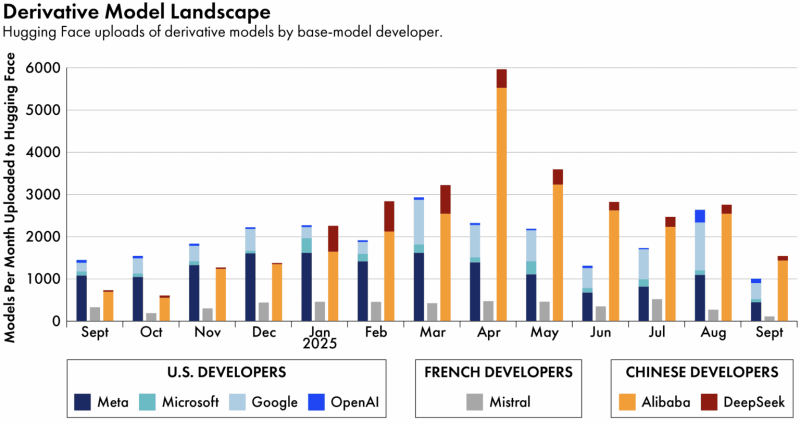⬤ Alibaba (BABA) has become the leading force in open-source AI development, according to recent Hugging Face upload data. The platform tracks derivative models—customized or fine-tuned versions built on existing foundations—and the numbers show China, particularly Alibaba, dominating the landscape. Developers worldwide are increasingly choosing Alibaba's Qwen models as their foundation for new AI projects.

⬤ The data shows a dramatic rise in Alibaba-based derivatives from late 2024 into mid-2025. At its peak, monthly uploads tied to Alibaba reached around 5,000 to 6,000 models—several times higher than derivatives built on Western alternatives from Meta, Microsoft, Google, or OpenAI. While these U.S. and European platforms maintain steady usage, their monthly numbers fall far short of Alibaba's impressive figures.
⬤ What's particularly striking is that major Silicon Valley companies are turning to Qwen as a practical shortcut for their AI deployments. This isn't just about geography—developers are drawn to models that are easy to modify and integrate into existing systems. The gap in derivative counts suggests that a significant portion of open-source AI innovation now relies on Chinese foundations rather than Western ones.
⬤ Industry observers note that Chinese AI models are catching up to U.S. competitors across key benchmarks and winning over more customers. The shift appears driven by practical considerations rather than politics. When companies prioritize cost-effectiveness, performance, and usability, geopolitical concerns often take a back seat—which helps explain why Alibaba's Qwen models are gaining traction despite ongoing political tensions between China and the West.
⬤ For investors watching BABA, this surge in developer adoption signals Alibaba's growing influence in the global AI infrastructure. As more developers build on Chinese AI foundations and comfort levels with these tools increase, China's role in shaping the future of AI becomes harder to ignore. If these trends continue, they could significantly impact how markets value Alibaba and its position in the competitive AI landscape.
 Eseandre Mordi
Eseandre Mordi

 Eseandre Mordi
Eseandre Mordi


